We are gathered in a well-lit hall, my whole US-based family is there as are dozens of friends and colleagues, sitting in rows facing the front. Some have flown here from other places. The mood is exciting, intriguing – how will it go? Is she ready?
I’m standing in the front, facing the audience, wearing my best clothes and shoes. I’ve hardly slept. They say that success is imminent in events like these if one is prepared and everyone involved has given their blessings for this event to happen.
Even so, I do not know exactly how it will unfold, what it will feel like, and whether I will earn the new salutation at the end.
At 9:00 am, we start.
On a Saturday morning in February 2013, I defended my Ph.D. thesis.
The 12th Anniversary
Each year, this anniversary captures my attention with a different blend of cinematic memories and emotions. This month marked the 12th anniversary(one full zodiac cycle), and it remains the happiest day of my life.
It evokes a unique blend of satisfaction and triumph, not over anybody or anything else, but of my own capabilities to commit, persist, and enlist the creativity and resources of myself and everyone else who was officially or unofficially part of my team to achieve something meaningful.
Altogether and with the guidance of my Ph.D. advisor, I brought five research projects to publication, co-authored an additional seven, and stretched my abilities beyond what I imagined.
At the beginning, I never fathomed that I would learn to program, align complex optical equipment, pass a bunch of difficult math-y courses (solidstate physics, computational electrodynamics, quantum mechanics, statistical mechanics, and reaction dynamics), teach an organic chemistrylab AND a physical chemistry lab, or even like physical chemistry much less choose it.
It evokes a unique blend of satisfaction and triumph, not over anybody or anything else, but of my own capabilities to commit, persist, and enlist the creativity and resources of myself and everyone else who was officially or unofficially part of my team to achieve something meaningful.
Altogether and with the guidance of my Ph.D. advisor, I brought five research projects to publication, co-authored an additional seven, and stretched my abilities beyond what I imagined.
At the beginning, I never fathomed that I would learn to program, align complex optical equipment, pass a bunch of difficult math-y courses (solidstate physics, computational electrodynamics, quantum mechanics, statistical mechanics, and reaction dynamics), teach an organic chemistrylab AND a physical chemistry lab, or even like physical chemistry much less choose it.
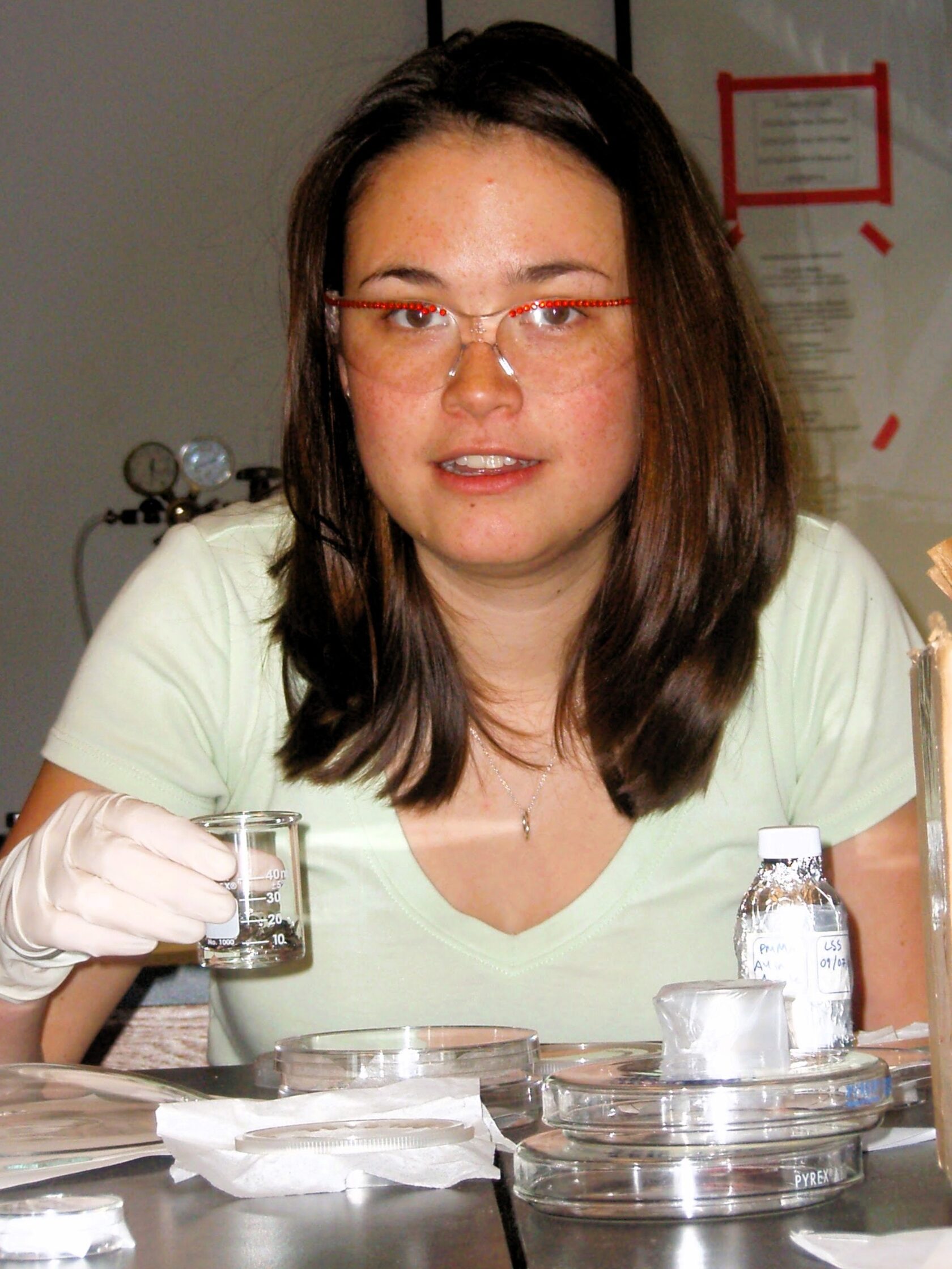
Chemicaling, Houston, TX, circa 2009. Photo courtesy S. Khatua.
Blood, Sweat, and Tears
Graduate school kicked my butt. And I loved it.
And in a recent focus group I conducted with Ph.D. students and postdocs(all in the same group), the sentiment was the same. In an anonymous livepoll, everyone loved, or at least didn’t hate their current life as a researcher,and the majority strongly agreed that it was very challenging.
My Ph.D. time was littered with tests and setbacks that ultimately builtmy expertise and character. Let me share some of those key moments ofmy six(6) years of Ph.D. work.
First the blood.
During my first year, an evening run changed my teeth forever when Ioverlooked a chain that then slingshot-ed me into the air and sent mesmashing into the pavement before limbs could break my fall.
I broke a front tooth – one of those two big teeth, and injured theneighboring one. Fortunately, no other bones were harmed.
Two weeks later, with scabbed upper lip and missing a front tooth whileawaiting my new crown to be manufactured, I gave my first presentation tothe Laboratory for Nanophotonics, an interdisciplinary group of professors,graduates students, and postdocs in chemistry, physics, and electrical engineering.
With a hole in my teeth, I could not pronounce terms like “plasmonics”,“theoretical simulations”, “single-particle spectroscopy”, or "vibrant" withoutwhistling through every “s”, "th”, and "v" sound.
Blood, Sweat, and Tears
Graduate school kicked my butt. And I loved it.
And in a recent focus group I conducted with Ph.D. students and postdocs(all in the same group), the sentiment was the same. In an anonymous livepoll, everyone loved, or at least didn’t hate their current life as a researcher,and the majority strongly agreed that it was very challenging.
My Ph.D. time was littered with tests and setbacks that ultimately builtmy expertise and character. Let me share some of those key moments ofmy six(6) years of Ph.D. work.
First the blood.
During my first year, an evening run changed my teeth forever when Ioverlooked a chain that then slingshot-ed me into the air and sent mesmashing into the pavement before limbs could break my fall.
I broke a front tooth – one of those two big teeth, and injured theneighboring one. Fortunately, no other bones were harmed.
Two weeks later, with scabbed upper lip and missing a front tooth whileawaiting my new crown to be manufactured, I gave my first presentation tothe Laboratory for Nanophotonics, an interdisciplinary group of professors,graduates students, and postdocs in chemistry, physics, and electrical engineering.
With a hole in my teeth, I could not pronounce terms like “plasmonics”,“theoretical simulations”, “single-particle spectroscopy”, or "vibrant" withoutwhistling through every “s”, "th”, and "v" sound.
Character strengths built:
Confidence and courage. Neither I nor my intellectual or presentation abilities lie in how I look, a critical conclusion for someone who also spent her life singing and performing.
Then more blood.
The following year, I triple-fractured my ankle falling off my bicycle. Fivedays later, I had surgery to reset the bones as a scaffold for healing theligaments and soft tissues damaged by the twist. Following that, I wore agiant "franken-boot" for several months, attended physical therapy, andspent more than a year diligently retraining myself how to walk.
The following year, I triple-fractured my ankle falling off my bicycle. Fivedays later, I had surgery to reset the bones as a scaffold for healing theligaments and soft tissues damaged by the twist. Following that, I wore agiant "franken-boot" for several months, attended physical therapy, andspent more than a year diligently retraining myself how to walk.
Character strengths built:
Self-discipline, setting realistic goals,asking for help and receiving it with gratitude.
I had been a spunky and fiercely independent person who oftenoverestimated her own abilities. With one non-weight bearing leg and a new tendency to fall asleep in a crowded room as my body needed all of its resources to heal, I needed help like never before. I accepted the help fromcolleagues and friends so willing to help me do experiments, drive mehome, and help me with groceries and other day-to-day needs. My quantum mechanics TA even came to me to help me with my homework instead of expecting me to go to them.
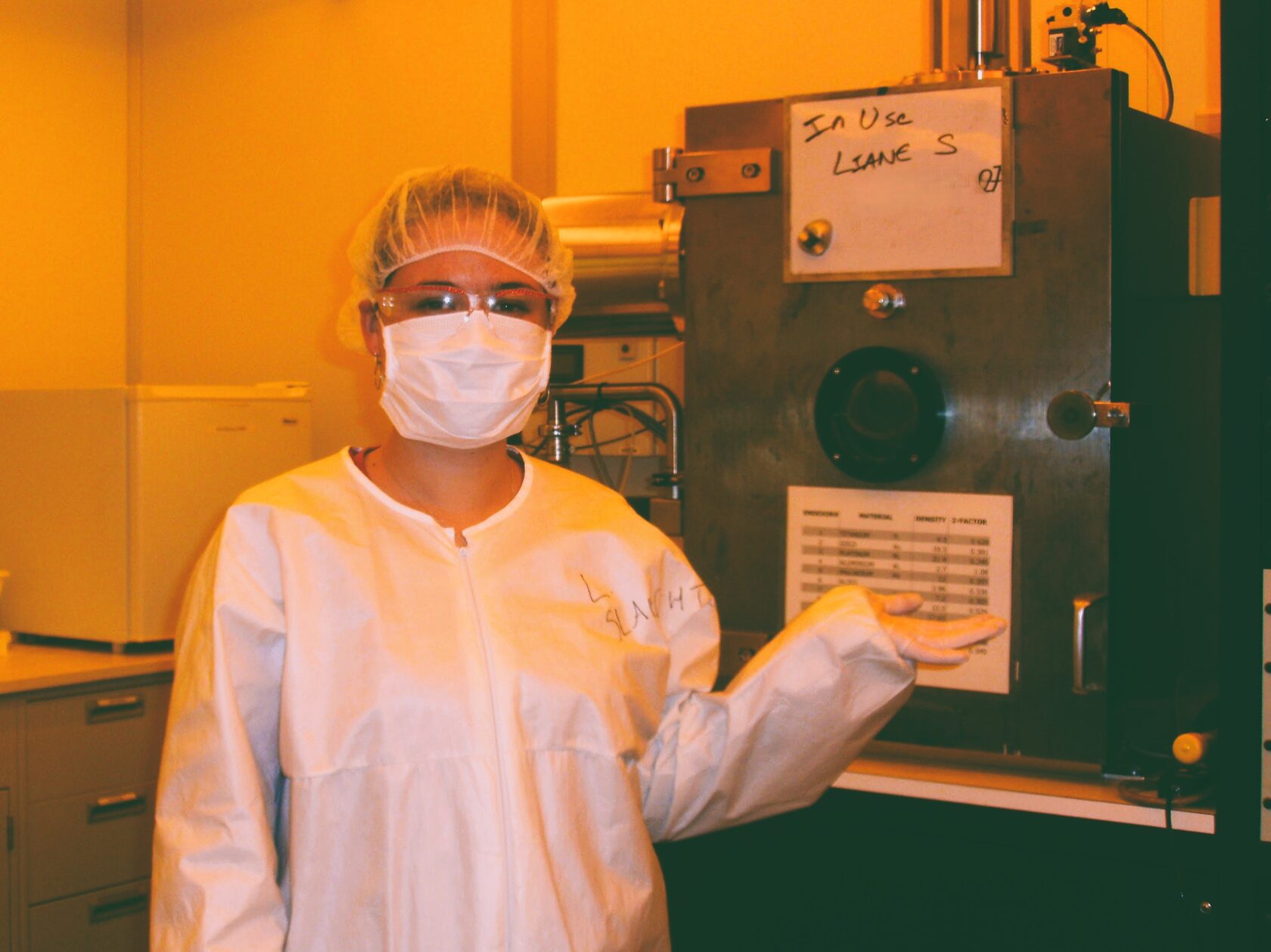
Waiting 2 hours for the chamber to reach high vacuum so I can vaporize some goldand deposit a perfectly even layer of it on a piece of glass. Houston, Texas, circa 2012. Photo courtesy J. Olson.
Then sweat.
Fortunately, the remaining four (4) years were physically harmless. I earneda fellowship that launched me into challenging and interesting coursework,mentored students, published a review article, and had the privilege of livingin Germany for 7 months for a new exchange program between my Ph.D.advisor and a professor in Mainz.
Returning to Houston in 2012, at the end of my 5th year of Ph.D., reality setin. I needed to graduate.
The last 6 months were brutal. I suspect that most Ph.D. completers wouldrather take a daily 10-minute ice bath for a year than to relive the last 6 months of our Ph.D.
When asked to describe the last 6 months in three words, here’s what somepeople said:
“Sleepless, stressful, exhilarating”; “All-nighters, caffeine, brutal”, “Long, ohgosh, no,”
The first year is challenging – it can be a jarring transition into the Ph.D.lifestyle with coursework, teaching, research, and being a person withgenerally more obligations.
The final stretch can be excruciating because we’ve started so much, doneso much, and now we need to finish what can be finished (already a painfuldecision), put it all together into a two-hundred-page tome with perfectformatting, coordinate with our big-deal professors and administration tomake the defense event, and secure our next job.
In this time, I survived by running. I ran to wake up. I ran to spend energy soI could sleep. I ran with my colleague to socialize. I ran to pass time whilewarming up the laser for two hours. I ran to my 2 am time slot on the sharedelectron microscope. I did running stretches during the 3 minutes needed toacquire each spectrum from my gold nanoparticle assemblies.
I lost 10 pounds in two(2) months. I was wired and tired. I got things done,but this part is like being in the second half of long-distance race - milesdown, energy spent, yet miles to go.
Fortunately, the remaining four (4) years were physically harmless. I earneda fellowship that launched me into challenging and interesting coursework,mentored students, published a review article, and had the privilege of livingin Germany for 7 months for a new exchange program between my Ph.D.advisor and a professor in Mainz.
Returning to Houston in 2012, at the end of my 5th year of Ph.D., reality setin. I needed to graduate.
The last 6 months were brutal. I suspect that most Ph.D. completers wouldrather take a daily 10-minute ice bath for a year than to relive the last 6 months of our Ph.D.
When asked to describe the last 6 months in three words, here’s what somepeople said:
“Sleepless, stressful, exhilarating”; “All-nighters, caffeine, brutal”, “Long, ohgosh, no,”
The first year is challenging – it can be a jarring transition into the Ph.D.lifestyle with coursework, teaching, research, and being a person withgenerally more obligations.
The final stretch can be excruciating because we’ve started so much, doneso much, and now we need to finish what can be finished (already a painfuldecision), put it all together into a two-hundred-page tome with perfectformatting, coordinate with our big-deal professors and administration tomake the defense event, and secure our next job.
In this time, I survived by running. I ran to wake up. I ran to spend energy soI could sleep. I ran with my colleague to socialize. I ran to pass time whilewarming up the laser for two hours. I ran to my 2 am time slot on the sharedelectron microscope. I did running stretches during the 3 minutes needed toacquire each spectrum from my gold nanoparticle assemblies.
I lost 10 pounds in two(2) months. I was wired and tired. I got things done,but this part is like being in the second half of long-distance race - milesdown, energy spent, yet miles to go.
Skills and character strengths built:
Persistence, prioritizing, and a strange kind of work-life balance. Grit – buckling down and committing fully.
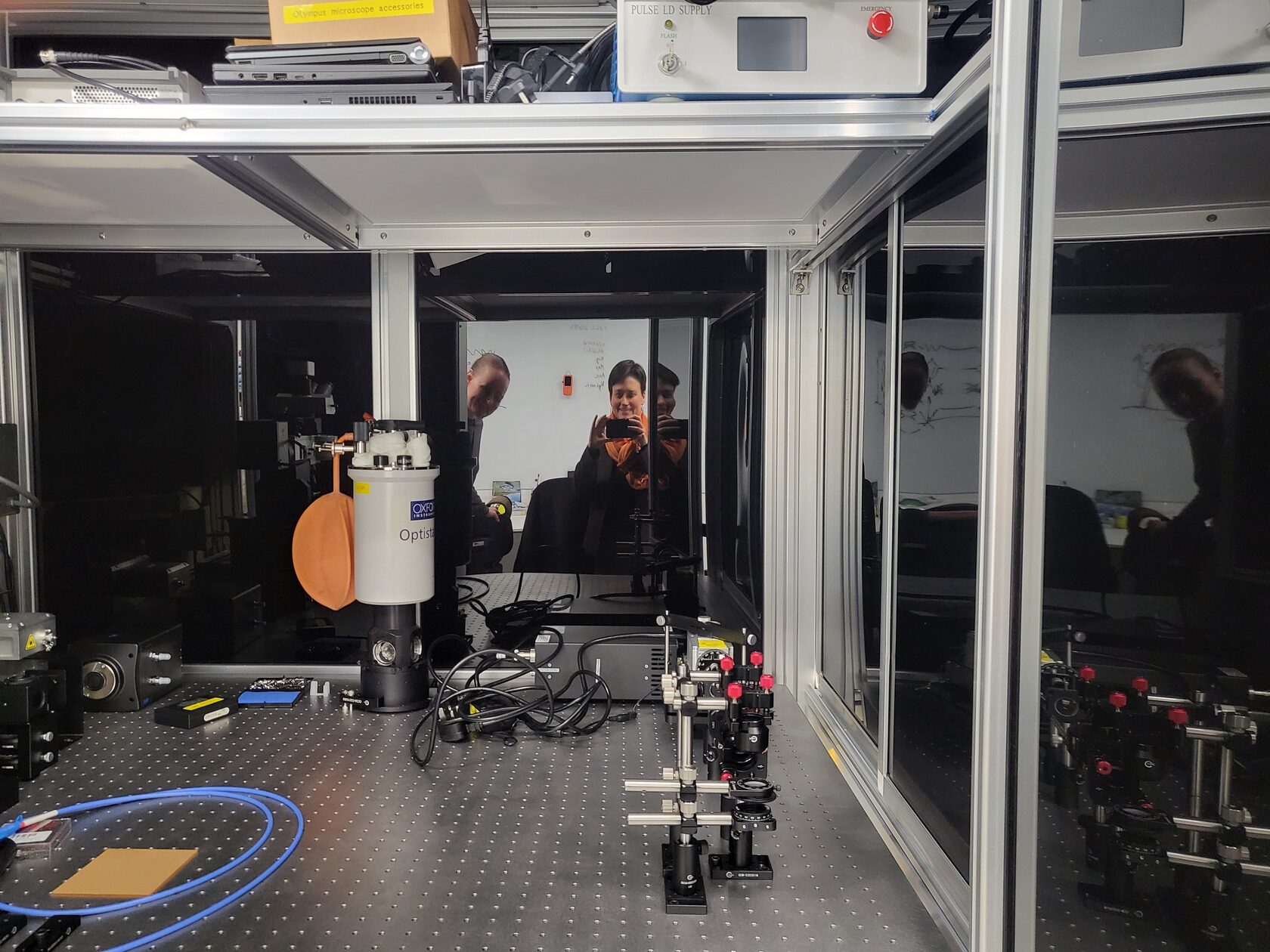
Recently I got to visit someone else’s lab and take a picture of their optics table, since Icouldn’t find mine from 12 years ago.
Finally, tears.
In the last 6 months, I felt pushed to invest more than ever in something so I could break up with it. Five years into this job (and Ph.D. is a job), it felt like a home. Familiar, interesting, and fortunately, I had supportive colleagues and advisors.
My research advisor gave me the extra pressure needed to graduate. Priorities, "no, no, and no" to a bunch of cool ideas, and tight deadlines. We had a great relationship overall, but this was still tough.
After a few weeks of “get me the next draft in four days” followed by “this draft is no good” followed by “you’re presenting the next group meeting”, my nerves were tired.
After said group meeting presentation, my co-advisors spoke with me privately.
At 7 pm on a Friday, after some long nights and a 90-minute presentation, I broke down in tears as they gave me feedback. My resilience hit a wall.
My vulnerability shifted the conversation, composure returned, and we focused on solutions rather than critique. “One last push, Liane,” they said. I took a whole weekend off, ran, returned with a fresh mind.
In the last 6 months, I felt pushed to invest more than ever in something so I could break up with it. Five years into this job (and Ph.D. is a job), it felt like a home. Familiar, interesting, and fortunately, I had supportive colleagues and advisors.
My research advisor gave me the extra pressure needed to graduate. Priorities, "no, no, and no" to a bunch of cool ideas, and tight deadlines. We had a great relationship overall, but this was still tough.
After a few weeks of “get me the next draft in four days” followed by “this draft is no good” followed by “you’re presenting the next group meeting”, my nerves were tired.
After said group meeting presentation, my co-advisors spoke with me privately.
At 7 pm on a Friday, after some long nights and a 90-minute presentation, I broke down in tears as they gave me feedback. My resilience hit a wall.
My vulnerability shifted the conversation, composure returned, and we focused on solutions rather than critique. “One last push, Liane,” they said. I took a whole weekend off, ran, returned with a fresh mind.
Skills & character strengths built:
Uber focus, negotiation, stakeholder management, self-regulation, the best workflows ever.
Seeing the finish line.
Days before Christmas break, my advisors said tome after reading a satisfactory draft of my final project manuscript, “Your thesis will be due on January 14th.”
Bravo. Yes. I will do it. I am happy to hand in my thesis on my birthday.
This was the greenlight, like reaching the last mile of a half marathon. Excited, willing to run hard to the finish.
Fortunately, my thesis and defense looked promising. I had written the introduction already and my previous publications comprised most of the remaining chapters.
In general, the thesis defense is a formality. The committee may still scrutinize your work and examine your thinking, in public and in private, and require revisions, but good advisors generally will not let us defend before we are ready. That reflects poorly on them.
I handed in my thesis on time and miraculously fixed a date when all of my committee members and all of my US-based family could come to Houstonfrom Pennsylvania, Nevada, New York, and California.
Days before Christmas break, my advisors said tome after reading a satisfactory draft of my final project manuscript, “Your thesis will be due on January 14th.”
Bravo. Yes. I will do it. I am happy to hand in my thesis on my birthday.
This was the greenlight, like reaching the last mile of a half marathon. Excited, willing to run hard to the finish.
Fortunately, my thesis and defense looked promising. I had written the introduction already and my previous publications comprised most of the remaining chapters.
In general, the thesis defense is a formality. The committee may still scrutinize your work and examine your thinking, in public and in private, and require revisions, but good advisors generally will not let us defend before we are ready. That reflects poorly on them.
I handed in my thesis on time and miraculously fixed a date when all of my committee members and all of my US-based family could come to Houstonfrom Pennsylvania, Nevada, New York, and California.
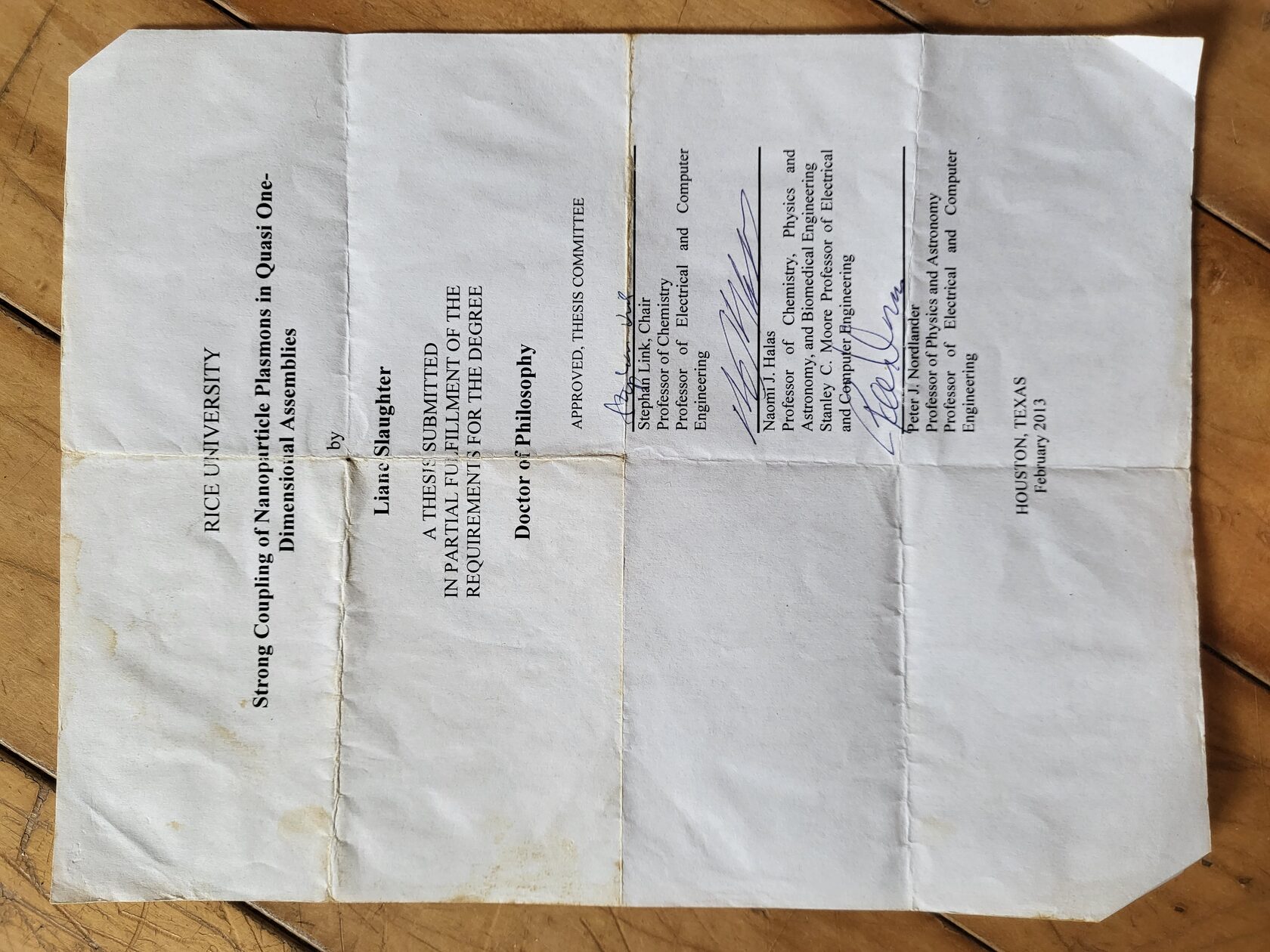
THIS is the ticket to graduation - anoriginal of the cover page of my thesissigned by all three members of mythesis committee. This copy may havetraveled around in a coat pocket forsome time before finding a good homein my Hong Kong home office.
Why is this the happiest day of my life?
Three reasons stand out:
Over to you! Three free questions to coachyourself:, I completed something fascinating and formidable. The journey transformed me, intellectually, professionally, and personally. I discovered capabilities I never knew I had, strengths that now fuel everything I do, even when the technical details fade into the background.
Second, this achievement is forever mine. No one can repossess an education. No one can strip away the mental tools we've forged, the ability to learn, to think, to solve.
Third, and perhaps most profound: the power of collective brilliance and support. Science is not a solitary pursuit - it's a symphony of minds, hands, and hearts. While it demands intelligence and resources, breakthrough science happens when diverse talents converge and complementary skills flow together to tackle problems no single person can solve. My defense celebrated not just my research, but my entire constellation of support -family, friends, colleagues, advisors. Their solidarity pushed me to push my limits. Some of these colleagues and advisors remain my closest friends.
Over to you! Three free questions to coachyourself:, I completed something fascinating and formidable. The journey transformed me, intellectually, professionally, and personally. I discovered capabilities I never knew I had, strengths that now fuel everything I do, even when the technical details fade into the background.
Second, this achievement is forever mine. No one can repossess an education. No one can strip away the mental tools we've forged, the ability to learn, to think, to solve.
Third, and perhaps most profound: the power of collective brilliance and support. Science is not a solitary pursuit - it's a symphony of minds, hands, and hearts. While it demands intelligence and resources, breakthrough science happens when diverse talents converge and complementary skills flow together to tackle problems no single person can solve. My defense celebrated not just my research, but my entire constellation of support -family, friends, colleagues, advisors. Their solidarity pushed me to push my limits. Some of these colleagues and advisors remain my closest friends.
Over to you! Three free questions to coach yourself:
- What is something you are proud of? It can be a moment or something you have achieved over a lifetime. Anything that makes you glow when you think of it.
- What skills and/or character strengths can you claim relating to what you are proud of?
- Now consider a challenge you are facing now. It can be a moment –like a conversation you need to have today, or something you need towork on over a long time. How can these skills or strengths help you shine through that challenge?
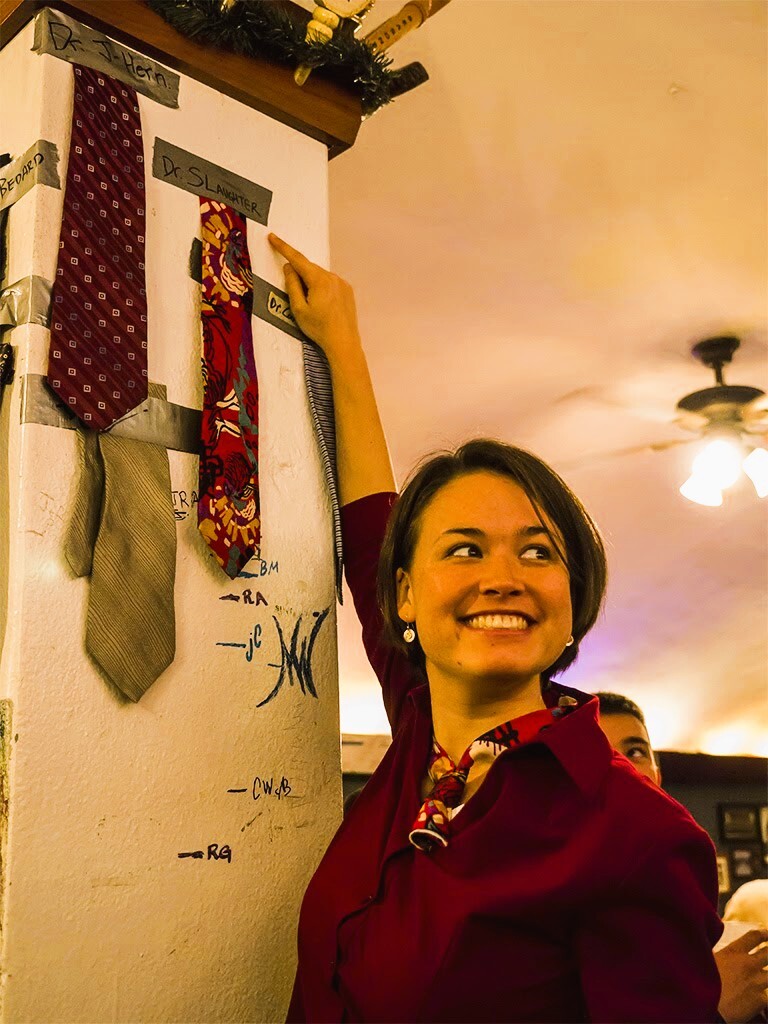
At Rice University, our tradition was toput on a tie during or after our thesisdefense, then cut it and duct tape it withour name on the pillar of Valhalla, thegraduate student bar named after thewarrior heaven of Norse mythology.Houston, TX, February 02, 2013. Photocourtesy of R. Slaughter.
Love this post and want to receive new stories like this in your inbox each month?
Subscribe to the monthly newsletter here!
